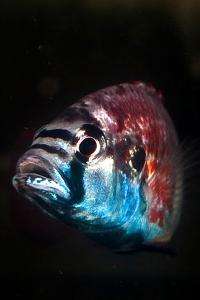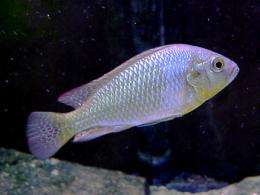Male African cichlid fish go from 'zero to 60' when mating calls, researchers find (w/ video)

(PhysOrg.com) -- In African cichlid fish society, only the dominant male reproduces. But Stanford researchers have found that if the dominant male disappears, a subordinate cichlid can rise to the procreative occasion with stunning speed, having kept its reproductive apparatus idling in low gear for the occasion. Other species, including mammals with similar social structures from mice to rhinos, may use the same approach.
If fortune favors the prepared, then the fates must gaze upon male African cichlid fish with exceptional fondness.
In cichlid society, only the alpha males procreate. Subordinate males spend their time – when an alpha isn't beating up on them – hanging around the fringes of an alpha's territory, feeding when they can and keeping their reproductive systems so suppressed they can practically pass for females. But should an alpha abdicate, the beta boys have turned out to be unexpectedly fast on the spawn, say Stanford researchers.
"It is amazing how quickly they can recover from being down and out," said Russ Fernald, a professor of biology, one of the authors of a research paper about the study in the current issue of Proceedings of the Royal Society B.
A newly self-appointed alpha begins "acting alpha" within a few minutes of the disappearance of the old top dog, can spawn successfully within a few hours and will have its sperm in top reproductive condition in less than a day. All this from a creature that for weeks has endured drastically lowered hormone levels, severely shrunken testes and a noticeable (and perhaps understandable) pallor compared to the brightly colored alphas that have been knocking them around and monopolizing all the females.
"Even the neurons in the subordinate males' brains that control their reproductive system are very small," said Karen Maruska, a postdoctoral researcher in Fernald's lab and a coauthor of the paper. "We originally thought that these males just couldn't do this, that they didn't have sperm, that they weren't reproductively competent."
It turns out, she said, that even though the subordinate males have very small testes compared to a dominant male, they still keep making sperm on the sly. Their reproductive system hasn't been throttled, just throttled down.
Even more surprising to the researchers was the increased viability of an ascendant cichlid's sperm.
"There is a signal from the recognition of social opportunity all the way into the gonads to change the quality of the sperm," Fernald said. "It was completely unexpected that the reach of social information would go that deep so quickly."
Fernald said the researchers had thought that if the social change did trigger a physiological signal, it might be a slow cascade of changes that eventually could result in heightened reproductive ability, but nothing like the rapid response they observed.
"Reproduction is so important that evolution has favored the rapidly ascending male," he said.

From white rhinos to mice and from Atlantic salmon to baboons, dominant males in many animal societies engage in "social suppression" to keep subordinate males from breeding. Socially suppressed males of different species exhibit a variety of changes in behavior and physiology as a result of the suppression. Often those males reduce the amount of energy they put into sperm production, since that energy is pretty unlikely to bear fruit.
But while much is known about physiological changes that occur in a male when it is being socially suppressed, little has been known about how such a male's physiology responds when it suddenly ascends to dominance and has the chance to reproduce, particularly the cellular changes that occur within the testes.
"You can't just go in and sacrifice a rhinoceros and see how its testes are working," Fernald said. Hence his lab's focus on the African cichlid, a relatively small fish native to Lake Tanganyika in East Africa. More abundant than rhinos and much less dangerous, but practicing social suppression in a way fundamentally similar to rhinos and other animals, cichlids make an excellent model for study.
Model behavior
In the study, the researchers would place two males of the same size into a tank with three or four females and half of a terra cotta pot, which served as the territory. By the time the fish had been in the tank for a day, one male would become clearly dominant, the other subordinate.
The researchers monitored each tank in Fernald's lab for four to five weeks, the same span of time that a dominant cichlid in the wild typically controls a territory before succumbing to predation or a successful coup by another cichlid.
If the same male maintained dominance the whole time, he would then be removed from the tank and the behavior of the subordinate male observed.
After allowing the ascendant male 24 hours to enjoy his new status, the researchers ended his reign, removing him to analyze changes in his physiology and sperm quality.
"It was clear they were investing energy in reproduction, so that when they became dominant males, they could switch very quickly," said Jacqueline Kustan, an undergraduate student working in Fernald's lab during the study. Kustan conducted much of the lab work and is the lead author of the paper describing the study.
The early sperm gets the roe
It makes sense that a male cichlid's reproductive system would keep humming along in low gear, Maruska said, because he must be prepared to perform quickly.
"He's not going to be able to hold that territory and convince females to come in and spawn with him if he doesn't have the sperm," she said. "That is probably one of the reasons this mechanism persists, so that he can basically back up his actions."
It is likely that methods to give a male's physiology a quick kick into reproductive high gear are present in other species. Fernald said that in every known vertebrate social system, males are competing to get access to females and in most cases use aggression to fight off opponents.
"The victors are the ones that get to reproduce and I would predict that they have mechanisms similar to this one, where the non-dominant male, as quickly as he can, will become able to reproduce," he said. "That is the name of the game."
More information: Subordinate male cichlids retain reproductive competence during social suppression, Published online before print July 6, 2011, doi: 10.1098/rspb.2011.0997
Abstract
Subordinate males, which are excluded from reproduction often save energy by reducing their investment in sperm production. However, if their position in a dominance hierarchy changes suddenly they should also rapidly attain fertilization capability. Here, we asked how social suppression and ascension to dominance influences sperm quality, spermatogenesis and reproductive competence in the cichlid Astatotilapia burtoni, where reproduction is tightly coupled to social status. Dominant territorial (T) males are reproductively active while subordinate non-territorial (NT) males are suppressed, but given the opportunity, NT males will perform dominance behaviours within minutes and attain T male testes size within days. Using the thymidine analogue 5-bromo-2-deoxyuridine (BrdU) to label germ cell proliferation, we found that the spermatogenic cycle takes approximately 11–12 days, and social status had no effect on proliferation, suggesting that spermatogenesis continues during reproductive suppression. Although sperm velocity did not differ among social states, NT males had reduced sperm motility. Remarkably, males ascending in status showed sperm motility equivalent to T males within 24 h. Males also successfully reproduced within hours of social opportunity, despite four to five weeks of suppression and reduced testis size. Our data suggest that NT males maintain reproductive potential during suppression possibly as a strategy to rapidly improve reproductive fitness upon social opportunity.
Provided by Stanford University














